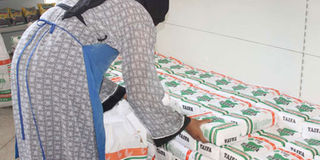Food crisis manifests leadership failure

A staff at Uchumi Supermarket in Mombasa restocks packets of the Sh90 2kg maize flour on June 10, 2017. Not drought, and not market cartels should be blamed for the unga crisis. PHOTO | WACHIRA MWANGI | NATION MEDIA GROUP
What you need to know:
- Fish, vegetables, chicken and fruits are in short supply, and, indeed, very expensive in Kenya.
- Importing food, food aid and nutritional insecurity are real big threats to our nation’s sovereignty.
Kenya, like many other African countries, again faces food insecurity that ought to be addressed through a sober search for long-term policy interventions instead of political rhetoric and blame games on the shortage and high prices of unga (flour).
It is the failure by the political leaders to focus national attention on measures that modernise agriculture and maintain ecological stability that is largely responsible for the shortage and high prices of ugali.
Not drought, and not market cartels should be blamed for the unga crisis.
HIGH COST
Even at a time when the country is exposed to many scientific and technological options to transform agriculture and food production, politicians are preoccupied with the search for who is responsible the persistent drought and high food prices.
Ugali without fish and vegetables does not complete a nutritious food menu.
Fish, vegetables, chicken and fruits are in short supply, and, indeed, very expensive in Kenya.
IMPORTED FOODS
We are importing fish from China, and eggs, maize and fruits from South Africa.
Belgium appropriated tilapia germplasm from Lake Victoria and may soon be providing fish aid to Kenya and the rest of East Africa.
Importing food, food aid and nutritional insecurity are real big threats to our nation’s sovereignty.
BIOTECHNOLOGY
Securing food and nutrition to assert our sovereignty is largely dependent on utilising our scientific and technological capabilities in biotechnology.
In this regard, policy and programmes to promote its development and application in agriculture must be matters that are high on the agendas of our politics and political governance.
The government’s lack of policy clarity and foresight to promote safe biotechnology applications, including genetic modification of crops and fish continues to deny the country possibilities of exploiting capabilities that are locked in the public universities, the Kenya Agricultural and Livestock Organisation (Kalro), and several Nairobi-based international agricultural research and technology institutes.
These include the African Agricultural Technology Foundation (AATF), the International Livestock Research Institute (ILRI), World Agroforestry Centre (Icraf) and the Biosciences East and Central Africa.
MODIFIED FOODS
Public universities produce at least 150 postgraduates in biotechnology yearly and Kalro has over the 10 years invested more than $100 million in agriculture biotechnology.
AATF is developing drought-resistant and water efficient maize through the application of biotechnology.
Yet, in 2013, the Kenyan Cabinet banned the development and introduction of genetic modified products.
The ban is actually a policy fallacy because Kenya is now importing genetically modified maize from South Africa and perhaps more from Mexico.
PROPER POLICIES
Unlocking our national scientific and technological capabilities in biotechnology and other fields must have the preoccupation of politicians, political parties and the Legislature.
The Jubilee Party and the National Super Alliance (Nasa) should not be at best silent on and at worst indifferent to biotechnology and its role in national security and sovereignty.
They need to unveil manifestos with clear policy initiatives on how they intend to lead the country in securing food security through modernisation of agriculture.
TECHNOLOGY
Fixing the price of unga is not even a short-term policy option.
It is a zero-sum policy measure that only serves market cartels and not the food insecure households.
Our politicians had better learn and provide leadership for technological change.
China’s, South Africa’s and Mexico’s hegemony in agricultural biotechnology is due to long-term policy championed by leaders.
Prof Mugabe is a research professor in science and innovation policy at the University of Pretoria. [email protected]




